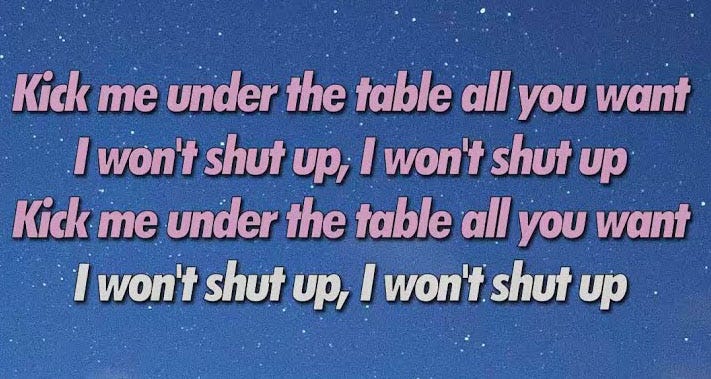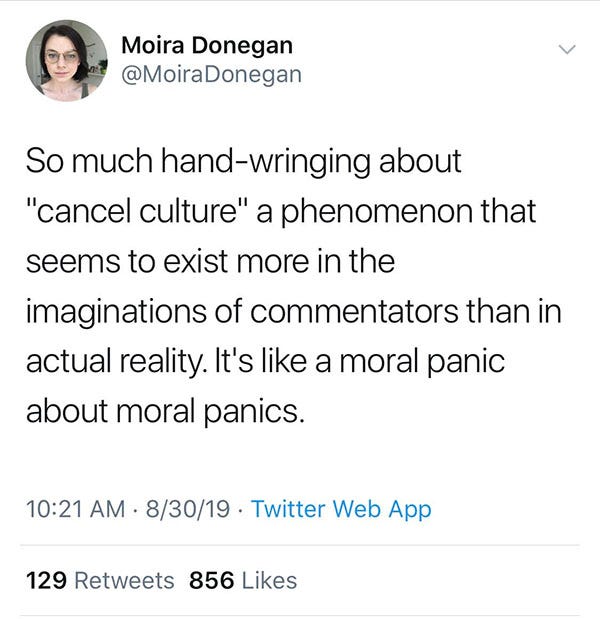How the Media Establishment Uses Cancel Culture During Moral Panics as a PR Ploy (Then Lies About It)
Powerful professionals in cultural fields must admit that cancel culture exists and can be overly punitive, then work to move on from it.

Less than a year ago, back in September of 2019, New Republic staff writer Osita Nwanevu published an essay titled “The ‘Cancel Culture’ Con,” arguing that the phenomenon known as “cancel culture,” a flash point in recent years across any public-facing profession, in which individuals are openly castigated and punished for anything ranging from actual criminal behavior to what amounts to thoughtcrime, doesn’t actually exist. Instead, he argued, it’s simply a defensive refrain used by conservatives and celebrities who are being criticized for insensitivity on social issues for which they were not previously taken to task. What’s more, he wrote, no one has had their lives meaningfully harmed by it.
There is some truth to what he describes, even if the overall argument is dishonest. Because cancel culture is a vague term with a definition that is not universally agreed upon and has consequences that can vary wildly depending on who is being cancelled, for what, when, and by whom, the term has indeed been cynically applied by defensive public figures who are merely being criticized for doing harm and/or causing offense but are otherwise in no danger of damaging repercussions. However, cancel culture can also, when wielded recklessly by the powerful, be a damaging force that does destroy lives unjustly, punishes individuals excessively for structural problems, and does little to advance the overall cause of social justice. Perhaps worst of all, it allows prominent cultural institutions to pin their widespread problems on a few disposable would-be bad apples.
A few days ago, amid a spate of high-profile firings in media for various racial offenses, Nwanevu tweeted a callback to former Esquire editor-in-chief Jay Fielden’s rather melodramatic exit message from his job in May of last year. The underlying message was clear: that departure, along with the firings that have happened over the last week, are something to celebrate. Now it’s certainly understandable why Nwanevu or anyone would be pleased that there’s accountability for acts that disrespect and make more difficult the lives of people of color in the industry, however such gleeful celebration of harsh punishment severely undermines the argument that cancel culture does not exist, nor does it cause harm.
Untold people in recent days have commented that the moral panic involving race that is currently playing out in cultural fields has similarities to the social dynamics that were present at the height of MeToo. In both cases, a social reckoning is taking place for long-standing oppression. Few would argue against the necessity of that, however the universally acknowledged justness of the wider cause has helped to obscure motivations by the powerful that are self-serving, if not outright cruel.
For example, one should question why The New York Times has been so eager to cover each of these firings, along with what has been described as a revolt among its own staff that led to the departure of its top Opinion editor. Just like with the NFL suddenly deciding its years of opposition to players protesting police misconduct was wrong, it’s calculated public relations in the face of social unrest. “Hey, we were brave enough to get rid of the actual racists and that was definitely all of them! No need to keep looking! We’re good now!”
It’s one thing to be fired. There’s valid reasoning that those who were fired in recent days deserved it. That some employees weren’t fairly compensated for video appearances at Bon Appetit is indeed egregious. As EIC, Adam Rapoport bears some responsibility for that. Surely a bunch of folks on the business side at Condé Nast do as well, yet we won’t see those heads roll for this, will we? Often these purges can function as a search for a scapegoat. The result might lead to mild reforms, but ultimately unfair power structures won’t be changed substantially.
To make these oustings into national news will possibly cripple the cancelled financially and socially - likely psychologically - for years to come, if not the rest of their lives. What happens when they try to pursue their next job and the first search result for their name is “oh, this person was fired for being a racist and it was national news.” Even for individuals with a long string of accomplishments, that can be devastating in a professional-managerial class office culture that is more sensitive about identity issues with each passing year. Does anyone really believe those recently fired constitute everyone in media in positions of power that are guilty of racist acts and exploitation? If they do, they shouldn’t.
Conservative outlets, meanwhile, are smugly told-ya-soing about the cancellations going on at their liberal counterparts, hailing it as proof that conservatives’ years-long crusade over campus politics was indeed prescient. The Wall Street Journal editorial board published on Tuesday what amounted to a lengthy bit of gloating and concern trolling. Yet the WSJ board has been more than fine with the NFL blackballing Colin Kaepernick. When Nike signed Kaepernick to an endorsement deal last summer, The Journal’s board described it as an “in-kind donation to Trump’s re-election.” That doesn’t strike me as a deep-seated conviction against cancel culture so much as deciding censorship is fine so long as you don’t like the message.
And therein lies the problem for the cancelled: you’re caught in the middle of an intractable culture war. One side has decided to cut you off forever and the other won’t accept you unless you adopt all of their pieties, pick up a club, and go swinging on their behalf. WSJ might performatively rend their garments over these purges, but will they hire any of the cancelled? Of course not - it would be terrible PR.
And what happens when someone is publicly smeared during one of these purging campaigns for acts they didn’t actually commit? The New York Times publicized the Shitty Media Men list in several articles as well as a lengthy feature, despite the fact that the majority of the allegations on it were never investigated, still true almost three years later. That’s not just irresponsible, it’s anti-journalistic. The Times made a hero of Moira Donegan, the creator of the spreadsheet, and her career has flourished since, yet she is wholly unconcerned if the list wronged anyone.
Despite the fact that the list is one of the more conspicuous examples of cancel culture in recent years, Donegan joined the chorus of liberal pundits in 2019 claiming that cancel culture is wildly overblown and perhaps doesn’t exist at all.

This past January, I self-published my account of being named on the list, having false allegations leveled against me (I offered proof that one claim is demonstrably false, others are impossible to disprove on my own), not knowing the identity of my accuser, and the tremendous harm the ordeal has caused. Only three outlets have covered it, all conservative. Not a single liberal entity has acknowledged my side, nor has any reporter reached out in over four months to investigate. Granted, I’m not particularly newsworthy as an individual, but the Shitty Media Men list as a cultural event undoubtedly is.
Before I decided to self-publish, I pitched the piece to a handful of outlets. One was The Atlantic. Their editors weighed whether to accept my piece for a few days, before issuing a vague rejection. One eventually replied, “Unfortunately, our capacity to take stories of this depth and complexity is constricted, so we will have to pass.” It read like one of those callous “I’m Actually at my Emotional Capacity” memes that people were making fun of last year.
Months later, as the country was roiling over Tara Reade’s accusation of sexual assault by Joe Biden, and how the media treated Biden far differently than other men accused the last few years, The Atlantic conscripted Donegan to write a piece that deflected shame on the matter. Her piece chastised the far left and the right for using Reade’s story to score points. Of course, both those groups were simply pointing out legitimate hypocrisies by centrist liberals. If those groups were able to score points, it’s because liberals did actually abruptly change their standards and lied about it.
Especially galling was that The Atlantic identified Donegan in the article only as “writer of a forthcoming book about sexual harassment.” Yes, technically that’s true but I think far more people would recognize her as the creator of the Shitty Media Men list, but that wasn’t mentioned at all. By May of 2020 when that article ran, the list was an inconvenient truth for a corporate media set that was trying to insist that the Believe Women mantra was never twisted from its original intention to give women’s claims of victimhood fair consideration into an automatic presumption of guilt for the accused, when in fact it had been in liberal spaces between October 2017 and early 2020.
We’re having a national conversation that seeks to make the practices of traditional law enforcement less punitive and destructive. That’s a cause I have supported and contributed toward. Last year, I worked full-time canvassing to primary a rather conservative-leaning Democratic prosecutor in Arlington, VA in favor of one who vowed to end the use of cash bail, decriminalize marijuana possession, and not charge minors with low-level non-violent offenses so as to keep them off the pipeline to significant prison time.
I believe what we’re seeing more often in high-profile cultural industries, especially journalism, is a form of extralegal social and cultural policing. We can argue about the righteousness of their tactics. Not every cancellation is the same, making this all the more knotty of an issue. Many of these situations call for nuance and nuance is nowhere to be found in the culture war. It’s hard to dispute that high-profile cancellations during a moral panic can often be brutal - in some cases actively malicious - and many observers are afraid to question anything because of the fervor surrounding the greater social issue, that they might be next to be cancelled if they speak out of line.
Because cancellations are not part of any formalized structure of justice, the punishment can effectively be permanent, with devastating results. I don’t mean to suggest that there should be no consequences for misdeeds; only that collectively we need to think more about solutions that are able to change oppressive structures and attitudes, rather than destroy individuals without any sense of proportionate response, meanwhile wealthy and powerful industries are able to frame cruelty and opportunism as heroism.

